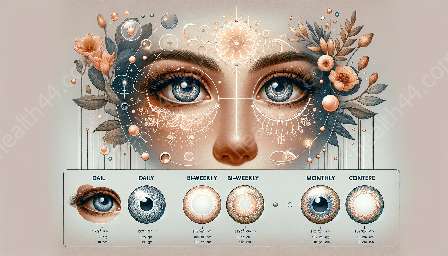Wearing contact lenses requires careful consideration, especially in challenging environmental conditions. Learn about the types of contact lenses and their compatibility in various environments to ensure optimum eye health and comfort.
Types of Contact Lenses
Contact lenses come in various types to cater to different needs, including:
- Soft contact lenses: These are made of soft, flexible plastics and are comfortable to wear.
- Rigid gas permeable (RGP) lenses: These lenses offer crisp vision and durability.
- Hybrid contact lenses: Combining features of both soft and RGP lenses, hybrid lenses provide comfort and sharp vision.
- Extended wear lenses: These lenses are designed for continuous or overnight wear, offering convenience for busy lifestyles.
- Disposable lenses: Available as daily, bi-weekly, or monthly disposables, these lenses are convenient and easy to maintain.
Considerations for Challenging Environmental Conditions
When considering wearing contact lenses in challenging environmental conditions, several factors need to be taken into account:
1. Allergens and Irritants
In environments with high levels of allergens or irritants, such as dust, pollen, or smoke, it is important to choose contact lenses with high oxygen permeability to minimize irritation and discomfort.
2. Dry and Arid Climates
In dry and arid climates, consider using contact lenses specifically designed to retain moisture and provide long-lasting comfort. Silicone hydrogel lenses are a popular choice for these conditions.
3. Humid Environments
In humid environments, contact lens wearers may experience increased moisture retention, leading to discomfort and potential issues with lens adherence. Using daily disposable lenses can help mitigate these challenges.
4. Dusty or Windy Environments
Whether engaging in outdoor activities or working in dusty or windy environments, it is advisable to opt for contact lenses with a secure fit and good debris resistance. RGP lenses offer excellent durability and resistance to particles.
5. UV Exposure
In sunny or high-altitude environments, it is crucial to consider UV protection for your eyes. Contact lenses with UV-blocking capabilities can provide added protection against harmful ultraviolet rays.
Compatibility and Recommendations
Considering the environmental conditions and individual needs, your eye care professional can recommend the most suitable contact lens type and wearing schedule. It's important to follow their guidance and adhere to proper lens care practices to ensure the health and comfort of your eyes.





















